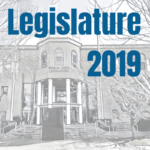By Richard Karpel
The first truly horrendous bill of 2019 is barreling our way.
Senate Bill 224 would hide the names of all members of Nevada’s Public Employee Retirement System (PERS) from public scrutiny. Anonymized information about the PERS system would still be subject to public records requests, but there would be no way to connect the data to specific state employees.
 Proponents of the PERS Secrecy Bill claim they’re just trying to protect seniors from identity theft, but provide no evidence that making vital information about the public retirement system available to the public has caused any damage. In fact, over 20 states — including California, New York and Illinois — go farther than Nevada and put their retirement database online with no apparent harm.
Proponents of the PERS Secrecy Bill claim they’re just trying to protect seniors from identity theft, but provide no evidence that making vital information about the public retirement system available to the public has caused any damage. In fact, over 20 states — including California, New York and Illinois — go farther than Nevada and put their retirement database online with no apparent harm.
There’s also the problem that the bill, as written, would not apply only to seniors. It would disappear from the PERS database — and potentially elsewhere — the names of all active and retired public employees.
There’s little doubt that if passed, SB224 would increase the incidence of fraud and corruption in the PERS system. It would also prevent the public from understanding where conflicts of interest exist. This point is especially relevant in Nevada, where we have a citizen legislature and many lawmakers are themselves either active or retired PERS members and can benefit from the changes they make to the retirement system.
I’m scheduled to testify in opposition to the bill today (Friday, March 1) in front of the Senate Committee on Government. NPA’s testimony and proposed amendment can be read here.
So it’s possible that the only way this bill can be stopped is with a huge public outcry. Please help start the ball rolling by contacting your representatives in Carson City and asking them to oppose SB224. Of course, you also have the power to generate public opposition in your community through your newspaper and website. If you are alarmed by this step in the wrong direction, we encourage you to consider doing that as well.
There’s better news about another bad bill that has been introduced in the Nevada legislature. Assembly Bill 1 would move public notice for hearings on new regulations proposed by the State Environmental Commission and local air pollution boards in Clark and Washoe Counties, from newspapers to government websites. At a hearing on Feb. 20 before the Committee on Natural Resources, Agriculture, and Mining, the agencies argued the bill should be passed for the sake of “consistency,” since other state agencies weren’t required to publish newspaper notice for their hearings. Seriously. That’s what they argued.
Six different committee members asked questions after the State Environmental Commission’s testimony. I was gratified to find that the tenor of the questions indicated their skepticism about the wisdom of the bill and their apparent strong support for newspaper notice. It left me feeling pretty good about our chances to defeat the bill. My testimony in opposition to AB1 is available here.
Here are the other bills we’ve been tracking so far in the 2019 session:
AB70 – Dozens of mostly minor amendments to the Open Meeting Law, adopted by the OML task force. Among other things, the bill increases administrative fines for violations of the law from $500 to up to $2,500 for a third offense. It also exempts violators who relied on the advice of an attorney for the public body.
AB86 – Comprehensive revision of local government purchasing processes. Increases the minimum threshold for publishing notice of a government contract solicitation from $50,000 to $100,000. Also allows notice on government websites in lieu of newspapers.
AB212 – Allows a state employee who “interacts with the public and performs tasks related to code enforcement” to obtain a court order requiring public information about them to be handled “in a confidential manner.”
SB83 – Requires the Public Employees’ Retirement Board to provide the State Controller with information about the actuarial valuation and soundness of the Retirement System. Also requires the Board to make information it provides to the Controller available “to any person upon request.”
SB183 – Amends Open Meeting Law. Requires meeting agenda revisions to be noted on government websites, and requires cities and counties with population above 45,000 to post supplemental information about the meeting on their websites.
SB220 – Requires website operators not to sell certain information they have collected on consumers who request non-disclosure. Provides a private right of action to consumers “injured as a result of a violation of this requirement” and authorizes the Attorney General to seek injunctions or civil penalties against offending operators.
 Nevada Press Association The best in Nevada journalism since 1924
Nevada Press Association The best in Nevada journalism since 1924

Regarding your stance on 224. The funds of which you speak are private. The RETIREMENT income is NOT paid to a person in the employ of the public. What that person EARNED during employment, that’s what a “position pays” — you can know what a game warden, with 10 years experience, and a master’s degree POSITION pays. You can’t know what Joe Smith earns, by name. WHO earns it isn’t the public’s business. THAT THE POSITION PAYS THAT – is.
To your argument about conflicts: in the event a senator has cancer – and supports a bill that would help fund a cancer research clinic for “the public” in his or her district – is a potential conflict. Still – you don’t get to know if the senator has cancer. POTENTIAL conflict isn’t how we handle things – EVIDENCE of misbehavior is gathered (by court order if necessary) and THEN used is how we do business. We don’t pre-suppose the conflict. YES – it’s harder to prove. On purpose.
Finally – double dipping. If a person double contributes – they get to double withdraw. It is entirely possible a person WORKS for 30 years in the public sector (PERS $); works for 20 years in the private sector (SS $) and then returns to work in the public sector (actual earning $). That’s not double dipping, or even triple dipping – that’s EARNING every penny and deserving every benefit. If you don’t want a double dipper to collect their $ (no matter the source) – then propose legislation that refunds a percentage of the withholding they paid. People who EARN two retirements, deserve 2 retirements. No matter the funding source – IF THEY WORKED THE WORK – they EARN the $.
The taxpayers absolutely deserve to know what a POSITION PAYS – they fund POSITIONS. Here’s the key: when it’s JANE SMITH earning the $ – we create (like it or not) a moral platform to judge JANE on what SHE deserves; when it’s “every retired X who worked 30 year” earns at least X$ – then there’s no morality attached to it. The taxpayer is NOT entitled to judge JANE. The taxpayer DOES get to judge what a position is worth – they DO NOT get to judge what a person is worth.